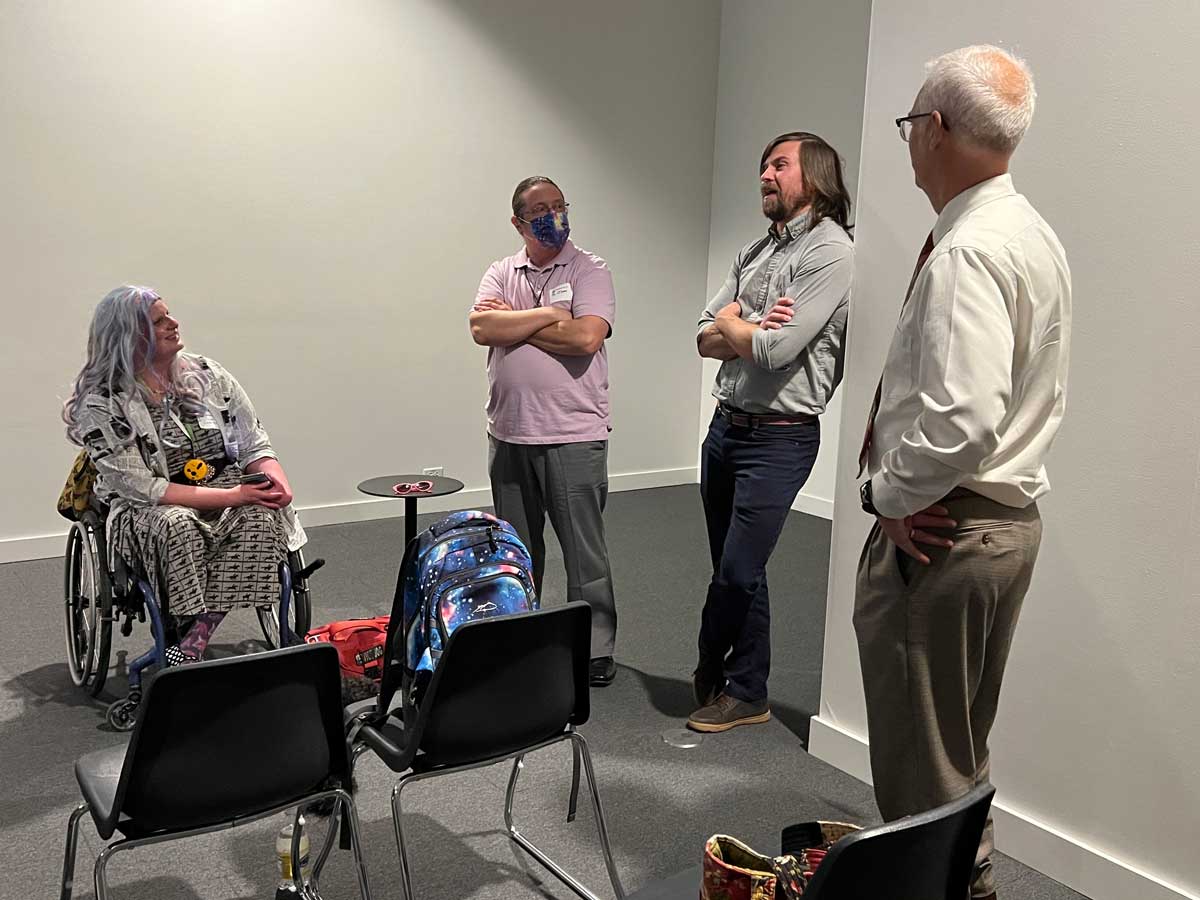The Language Lab: Aut disce, aut discede, manet sors tertia: caede

When Classics Professor Mark Damen started developing a new master’s program in the history department, he reached out to more than thirty institutions around the country to share his ideas and solicit feedback. Over and over he heard the same thing: if a student enters a PhD program without a deep understanding of an ancient language, they are already at a disadvantage. Looking for ways to better prepare USU students to succeed, Damen and his colleagues developed the Ancient Languages and Cultures program.
Now in its inaugural year, the Ancient Languages and Cultures program requires students to take courses in a historical field of interest—European history or environmental history or American history, for example—but it adds to that three semesters of coursework in the Ancient Language Lab, a collaborative translation class that provides linguistic training and an understanding of historical methods.
“The goal for students in the Language Lab is simple,” Damen says. “It’s like pilot training. This is about flight hours. It’s about spending more time with the language.” As the program grows, Damen hopes to expand language options to include Tibetan, Sanskrit, Arabic, and Hebrew.
A core feature of the Ancient Languages and Culture program, the Language Lab developed organically out of needs within the history department. A few years ago, Dr. Norm Jones approached Damen to ask if he could help him with a Latin translation. At the time, Damen was teaching a Prose Composition course, where students are tasked with translating documents from English into Latin. He had the idea of bringing Jones’s document to students to have them translate it from Latin to English. The students lit up. They worked with a new sense of purpose. They argued over the exact wording and syntax. Damen never went back to prose composition that term.
 Norm Jones (left) translating with students in the Language Lab
Norm Jones (left) translating with students in the Language Lab
The Language Lab now collaborates with faculty across campus. They have continued to translate documents for Jones, but they have also worked with Mary Barkworth, Associate Professor of Biology, who needed access to the exact wording of plant descriptions in Carl Linnaeus’s Species Plantarum. English Professor Phebe Jensen has also called on the Language Lab to help translate parts of a pamphlet written by the astrologer Richard Harvey, in which Harvey provides predictions and divinations. Happy prognostications—like the health of kings, good weather, plenty of crops—are always reported in English in the pamphlet. More sensitive prognostications, like the death of a king, for example, are generally reported in Latin. Needing access to these darker items, Jensen reached out to the Language Lab.
“They have absolutely saved me on this,” Jensen says. “The students are amazing. They are fabulously detail-oriented; they really know their vocabulary and grammar to help tease out subtle meanings; and they have been enthusiastic co-conspirators in this very arcane work. It’s been a pleasure.”
“My motto,” says Damen, “is that we’ll tell you what the document says, but we have no idea what it means.” Because context is essential to providing the most accurate translation, the Lab invites the scholars to visit during translation sessions. In this way, the effort becomes a collaborative one, a back-and-forth between experts in a historical field and the Latin-language learners.
On the day I visited, Jensen begins by providing important context: “This is an astrologer talking to Charlemagne,” she says. Students look up words on their phones. Damen flips through a large dictionary on the desk next to him. They all call out words as they find them, and slowly they begin piecing sentences together. Someone asks what the difference is between aquatic animals and sea animals. There’s a fair amount of discussion on this, and just when it seems like maybe the students are off track, Jensen chimes in: “Yes, yes. He’s talking about the problems of the water.” Someone makes a joke about Red Lobster, and then the class moves on to decide whether the word they’re struggling with is best translated as “obscure” or “insignificant.” When the class is over, Jensen sets up another time to visit; there’s still work to be done on Richard Harvey’s pamphlet, and as students filter out, Damen, Jones, and Jensen joke about the motto of the class, taken from a message hung above a door at Winchester College in the 16th century: Aut disce, aut discede, manet sors tertia: caede. Either learn, leave, or take the third way: death.
 Richard Harvey's pamphlet
Richard Harvey's pamphlet
It’s not just professors the Lab helps. Graduate student Jonah Bibo, who is working on a master’s thesis exploring the environmental history of the Aniene Valley in Italy, brought records of catastrophic flooding for the Lab to decipher. Kristen Brady, a second-year master’s student writing a thesis on the first documented case of stem-cell based ovarian cancer, sought the Lab’s help translating medical texts. As to what documents the Lab might translate in the future?
“Who knows?” says Damen. “Whatever Latin text someone runs across in their research, we’ll translate it for them. The surprise is half the fun.”



 Norm Jones (left) translating with students in the Language Lab
Norm Jones (left) translating with students in the Language Lab Richard Harvey's pamphlet
Richard Harvey's pamphlet
